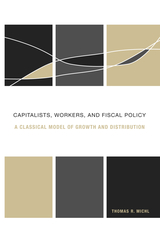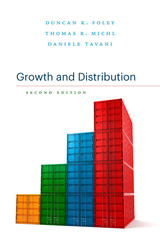
Drawing on the work of the classical-Marxian economists and their modern successors, Capitalists, Workers, and Fiscal Policy sets forth a new model of economic growth and distribution, and applies it to two major policy issues: public debt and social security.
The book homes in specifically on the problem of fiscal policy, examining the ways that taxation and government spending affect the distribution of wealth and income as well as the rate of economic growth. Thomas Michl’s model shows that public debt has a regressive effect on wealth distribution. It also demonstrates that the accumulation of wealth by public authorities, for example, in the form of a pension reserve such as the U.S. social security trust fund, can have a progressive effect on wealth distribution, both directly (since it represents ownership by the citizenry) and indirectly through its general equilibrium effects on the structure of accumulation. The book’s findings provide an analytical foundation for a macroeconomic policy of using fiscal surpluses to accumulate a public pension reserve fund that serves to effect a progressive redistribution of wealth.

Growth and Distribution is the first text designed to support a comprehensive advanced undergraduate or graduate course on the theory, measurement, and history of economic growth. The book, which presents Classical and Keynesian in parallel with Neoclassical approaches to growth theory, introduces students to advanced tools of intertemporal economic analysis through carefully developed treatments of land- and resource-limited growth, and covers money and growth, the impact of government debt and social security systems on growth, and theories of endogenous growth and endogenous technical change. The models emphasize rigorous reasoning from basic economic principles and insights without excessive formal complication, and respond to students' interest in the history and policy dilemmas of real-world economies. Surveys of data and discussion of empirical controversies are closely integrated with the development of theoretical tools. The book includes access to a comprehensive data set extending the Penn World Tables in a form suitable for exploration in hands-on student projects.
In addition to carefully worked examples showing how to use the analytical techniques presented, the book contains many problems suitable for inclusion in problem sets and examinations. Detailed answers to these problems are also provided.

A major revision of an established textbook on the theory, measurement, and history of economic growth, with new material on climate change, corporate capitalism, and innovation.
Authors Duncan Foley, Thomas Michl, and Daniele Tavani present Classical and Keynesian approaches to growth theory, in parallel with Neoclassical ones, and introduce students to advanced tools of intertemporal economic analysis through carefully developed treatments of land- and resource-limited growth. They cover corporate finance, the impact of government debt and social security systems, theories of endogenous technical change, and the implications of climate change. Without excessive formal complication, the models emphasize rigorous reasoning from basic economic principles and insights, and respond to students’ interest in the history and policy dilemmas of real-world economies.
In addition to carefully worked out examples showing how to use the analytical techniques presented, Growth and Distribution presents many problems suitable for inclusion in problem sets and examinations. Detailed answers to these problems are available. This second edition includes fresh data throughout and new chapters on climate change, corporate capitalism, models of wealth inequality, and technical change.
READERS
Browse our collection.
PUBLISHERS
See BiblioVault's publisher services.
STUDENT SERVICES
Files for college accessibility offices.
UChicago Accessibility Resources
home | accessibility | search | about | contact us
BiblioVault ® 2001 - 2024
The University of Chicago Press









